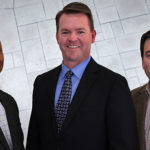AUSTIN—Polarization, confirmation bias and dehumanization damage public life, syndicated Washington Post columnist and social observer Michael Gerson told a Texas Baptist Christian Life Commission gathering in Austin.
However, Christians can offer a hopeful alternative through a commitment to the common good grounded in the conviction that all people are made in the image of God, said Gerson, former speechwriter and policy adviser to President George W. Bush.
Gerson, keynote speaker at the CLC Advocacy Day conference at Woodlawn Baptist Church in Austin, said politicians he knows “complain about a political atmosphere more toxic than any they can remember.”
Polarized Americans self-segregate
Polarization grows out of a culture in which people live in “increasingly homogenous political communities in silos of the mind,” Gerson said.
Americans self-segregate politically, culturally and geographically, “and our views of people in the opposing camp become increasingly more negative,” he observed.
“The result is the careful weaving of cocoons,” Gerson said, noting an increasing number of people in the United States who live in “cultural bubbles” where they cannot imagine how anyone could live differently or think differently they do.
“The politics of polarization can win an election but wreck democracy,’ he said.
Resisting polarization begins with a change in attitude, Gerson insisted, calling for Christians to understand and love both those who are inside and those who are outside their group.
A polarized culture leads to confirmation bias that affects how people view reality, he added. Citizens in a polarized nation not only seek out information that confirms their preconceived ideas, but also interpret information through a lens that distorts facts to fit into their pre-existing ideas.
Sign up for our weekly edition and get all our headlines in your inbox on Thursdays
“Group commitments become more powerful than reason itself,” he said.
An antidote to this malady, Gerson asserted, is the willingness to “call out your own side.” While few are persuaded when people with opposing views criticize each other for distorting facts, “it is different and powerful to police your own,” he said.
“The hardest thing is to confront confirmation bias in ourselves,” Gerson acknowledged. “All of us have a tendency to see an enemy when we really need a mirror.”
Moral polarization demands a spiritual solution
The ultimate destination of a polarized society gripped by confirmation bias is dehumanization, and that can lead to violent acts, he said.
“There is no denying dehumanization has become part of our public discourse,” Gerson said, confessing his fear that the ideals that shaped the nation’s founding could be replaced with different and lower principles.
“There may be structural reasons, but there aren’t structural answers for moral polarization,” he said. “The answer will be spiritual—not in the sense of piety but in the sense of mutual grace. There is only one force that than overcomes moral polarization, and it is empathy.”
Religion traditionally has been a source of healing and truth, but it also can fall prey to embracing fear of those who are different, he asserted. Gerson—a conservative evangelical Christian—pointed to the danger of evangelicals becoming too closely identified with “one populist nativist party.”
“The predominant narrative of white evangelicals is tribal rather than universal,” he said. “The very thing that should repel evangelicals—the dehumanization of others—is sometimes what seems to fascinate and attract them. …
“Pro-life arguments are discredited by an association with misogyny. Arguments for religious liberty are discredited when we say Muslims shouldn’t have any religious rights. Arguments for family values are discredited by nativist disdain for migrant families. And the ultimate harm here is to the reputation of faith itself.”
Failure in moral formation
This represents not only a failure of Christian leadership, but also “a failure of the Christian church in the moral formation of its members,” Gerson asserted.
“It would be helpful for Christian political engagement to at least have some roots in Christian ideals,” he said.
Christian political engagement should begin with “a certain anthropology—a transcendent view of human rights and dignity” grounded in the belief that all people are created by God and loved by God, he insisted.
While there is no specifically Christian position on how to ensure border security, for instance, “religious leaders have a solemn moral duty to oppose the dehumanization of migrants,” Gerson said.
If Christians truly believe each person bears the image of God, then “cruelty, bullying and oppression are cosmic crimes,” he added.
Christian approach to political engagement
A distinctively Christian approach to social engagement should be characterized by a deep commitment to the common good and should take seriously the concept of the kingdom of God, Gerson said.
“The nature of the kingdom determines how it is properly advanced,” he said. “You can’t advance a vision of liberation by oppressing the conscience of others. You can’t advance a vision of human dignity by dehumanizing others. You can’t advance a vision of peace with violent and demeaning language. …
“The proper role of Christians in politics is not to Christianize America. It is to demonstrate Christian values in the public realm.”
Christians who seek to be socially engaged need to “remember our history and recover our heroes,” he said.
Noting “the ability of compassion and generosity to break down walls of contempt,” Gerson pointed to the example of African-American religious leaders during the Civil Rights Movement and members of Emanuel African Methodist Episcopal Church in Charleston, S.C., after a mass shooting perpetrated by a white supremacist.
“Christians gain influence in our culture—real, lasting influence—when we act like Jesus,” Gerson said.
A ‘difficult but not impossible’ moment
In an interview after his keynote address, Gerson emphasized the role of the church in rebuilding the “shared sense of common purpose” in a polarized society.
“The moment is difficult, not impossible,” he said. “The bonds of our country are frayed, not broken. But we need healing influences, and the church should be one of those influences.”
The church must take seriously its teaching role not only by imparting doctrine, but also providing a moral and ethical foundation for its members, he asserted.
“We have 2,000 years of reflection on how Christians should act when they leave the doors of the church,” Gerson said.
Churches can help followers of Christ learn “the framework of values that Christians should bring to public life,” he said.
Christians also benefit from friendships with people who are genuinely seeking answers but hold different views, he noted.
“Out of this community of minds, people are changed,” he said. “They see first of all that people with different views are human beings, not just cut-out figures in a morality play. They’re actually human beings that need to be loved in practical ways.”














We seek to connect God’s story and God’s people around the world. To learn more about God’s story, click here.
Send comments and feedback to Eric Black, our editor. For comments to be published, please specify “letter to the editor.” Maximum length for publication is 300 words.